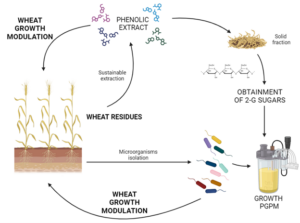Modern agriculture faces significant challenges in sustaining a fair, healthy, and environmentally friendly food system, which is aggravated by the imminent global population growth, expected to reach 10 billion by 2050.
The health of soil emerges as a pivotal factor in ensuring the ability of plants to meet the needs of a growing population for food. In response to these challenges, the Farm2Fork strategy, aligned with the Green Deal, and the Food 2030 Agenda, aims on transforming food systems into resilient entities that provide accessible, affordable, and healthy food for everyone.
Tribiome’s vision
TRIBIOME’s vision is to develop and implement a systemic solution to transform current food production systems into resilient food production systems. To this end, TRIBIOME aims to deepening the knowledge of soil/plant/animal and human microbiomes, as well as their interrelationships and interconnections, so that they can play a leading role in the resilience of food production systems. TRIBIOME will face the main challenges, such as the need to minimize resources, reduction of the environmental impact and healthy and plant-based food chain promotion, while feeding a constantly growing world population under the paradigm of climate change.
The solution proposed by TRIBIOME focuses, in the first instance, on the microbiome related to agricultural production, present in the rhizosphere, deepening the study in three countries (Spain, Italy, and South Africa). The aim is to go insight soil-plant microbiome interactions and how they vary in different abiotic and biotic stresses, as well as to be able to implement bioaugmentation technologies to enhance biofortification in micronutrients (S, Zn and Fe) directly related to their impact on both human and animal health.
A circular approach
The overall circular strategy (Figure 1) relies on the utilisation of modulators, obtained from wheat coming from different climate and soil parameters and countries (Italy and Spain), and their validation in the same fields.
Samples of root and soil of two different wheat varieties (Triticum durum and Triticum aestivum) harvested in Italy (Sicily, Tuscany) and Spain (Andalusia, Castilla y Leon, Castilla la Mancha) were received by ITENE, which has proceeded to the isolation and characterisation of plant growth promoting microorganisms (PGPM). Different morphologies were first isolated and then tested for PGP activities of interest, such as resistance to high salt concentration and high temperature, ability to grow at different pH and in presence of heavy metals and capability of mobilising organic phosphate. Over 150 microorganisms have been isolated from root and soil of T. aestivum and T. durum.
On the other hand, wheat residues have been processed to extract phenolic extracts for their application as modulators in the field. Moreover, the solid fraction, resulting from the extraction process, has been dried out and pretreated to obtain second-generation sugars, which are used for the growth of PGPM.
TRIBIOME’s overall circularity, throughout the zero-residue circular approach, will further support the transition into a novel food production system.

Figure 1. TRIBIOME’s approach to circularity and overall sustainability.
Want to know more ?
Contact catherine.malingreau@wagralim.be or Follow the project’s LinkedIn page

